Health
What works, what doesn’t work? Researchers uncover the effect of supporting districts to operationalise digital payments for vaccination campaign workers
Published
5 months agoon
By
Mak Editor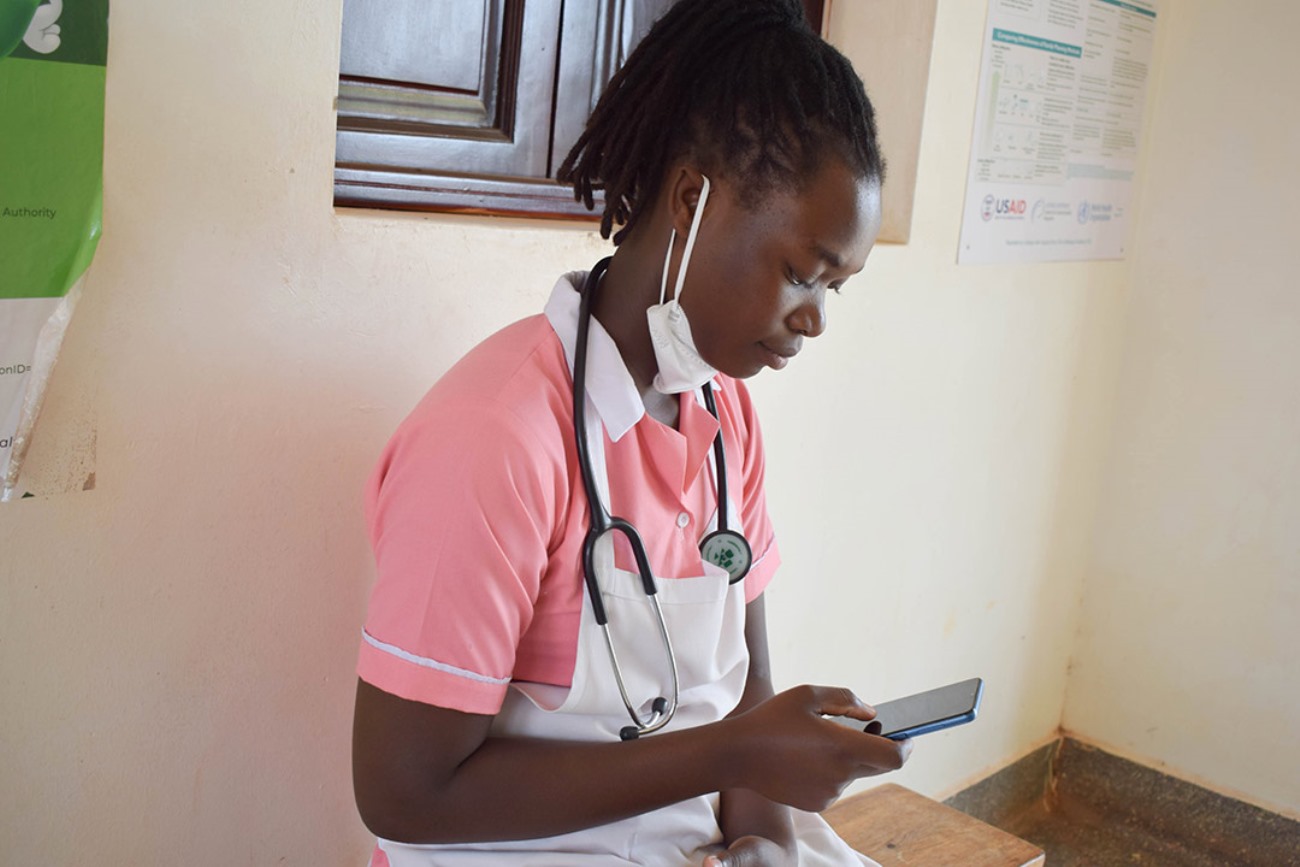
By Joseph Odoi
A motivated and satisfied health workforce is critical for the success of mass vaccination campaigns against diseases like polio. High-quality vaccination campaigns can interrupt disease transmission, especially during and after periods of disrupted health services, such as those caused by the COVID-19 pandemic.
In sub-Saharan Africa, most vaccination campaign healthcare workers (VCHWs) have historically been paid in cash. Cash payments are often plagued by delays in funds disbursement, leakages, theft risks, and limited financial transparency. These challenges can negatively affect vaccination coverage and worker satisfaction.
To address these challenges, many countries are transitioning to digital payment systems, which are perceived as faster, more convenient, traceable, reliable, and easy to implement. Digital financial systems are already being rolled out in countries including Côte d’Ivoire, Ghana, Mali, Congo, and the Democratic Republic of the Congo. Uganda, with a projected population of nearly 41.6 million, had over 30 million registered mobile money customers using e-cash in 2019.
While early rollouts of digital payments have been largely successful, their full impact on vaccination campaign workers had not been systematically evaluated.
From 2021 to 2024, Makerere University (Uganda) and the University of Dakar (Senegal), with support from the Gates Foundation and technical partners including the Solina Group, WHO AFRO, and the Ministries of Health and Finance in both embarked on an important journey of research under the Digital Health Payment Initiatives and Research (DHPI-R) Project in 28 countries in Sub Saharan Africa
To explore the experiences and lessons of polio vaccination campaign healthcare workers (VCHWs), both male and female, during the 2022 oral poliovirus vaccination campaign in Uganda, researchers led by Prof. Peter Waiswa (principal investigator), together with Margaret McConnell, Juliet Aweko, Daniel Donald Mukuye, Charles Opio, Maggie Ssekitto Ashaba, Andrew Bakainaga, and Elizabeth Ekirapa-Kiracho, with support from the Gates Foundation, conducted a study titled “The Effect of Supporting Districts to Operationalise Digital Payments for Vaccination Campaign Workers: A Cluster Randomised Controlled Trial During the 2022 Polio Vaccination Campaign in Uganda.”
This study examined whether supporting districts to implement electronic cash (e-cash) payments, instead of cash, increased e-cash usage and improved vaccine campaign healthcare workers’ (VCHWs) motivation and satisfaction during an oral poliovirus vaccination campaign in 2022 in Uganda.
The mixed method study now published in BMJ Global Health, September 2025 was conducted in 54 districts in Uganda that had set up the government e-cash payment platform by May 2022. It involved healthcare workers supporting the polio vaccination campaign, regardless of direct vaccine contact. This included nurses, clinicians (vaccinators), mobilisers, community health workers (village health team members), recorders, local council representatives, and supervisors. The unit of randomisation was the district, while the unit of enrolment and data collection was the individual worker.
Method and Setting
As part of this study , In November 2022, a total of 54 districts and 2,665 vaccination campaign healthcare workers (VCHWs) were enrolled in the study and randomly assigned to two groups. Intervention districts received training on using the government e-cash platform, including managing user roles, uploading beneficiary data, and generating payment reports.
The control districts received the standard support given to districts during mass vaccination campaigns from the MoH, MoFPED, WHO and other development partners. This support included group training on implementation of payments, provision of vaccination materials and financial aid.
The study collected data on how VCHWs were paid, their motivation, and their satisfaction with the payment method. Overall, 765 VCHWs in intervention districts and 589 in control districts received e-cash payments.
Findings
Mode of payment for the vaccination campaign healthcare workers
Overall, approximately half of the campaign workers, 50.8% (1354/2665) were paid digitally (e- cash), either using mobile money or via the bank (online supple mental table 2). Payment by e- cash was higher among females, 53.9% (656/1215) compared with males, 48.1% (698/1450) and was lowest among campaign workers aged 30–39 years, 48.7% (368/765). E- cash payment was higher in the intervention arm at 57.5% (765/1,330) in comparison to the control arm at 44.1% (589/1,335).
Satisfaction with payment received during the campaign
Only 36.5% (705/1930) of the VCHWs were satisfied with the payment received during the campaign, with satisfaction being slightly higher in the intervention arm, 37.9% (353/931) compared with the control arm 35.2% (352/999) and among females 37.9% (351/925) compared with males 35.2% (354/1005). Satisfaction was lowest among the married workers, 35.7% (575/1611) compared with the other categories.
Timing and completeness of payments
Nearly, all VCHWs were paid after the campaign, 97.6% (1884/1930), with no significant difference between the intervention (98.1%, 913/931) and the control (97.2%, 971/999) arms
Delayed/non- payment was highest among those with no formal education, 34% (17/50) and among community mobilisers, 30.7% (392/1071). The majority (70.6%, 1362/1930) of the VCHWs stated that the payment received met or even exceeded their payment expectation.
Participants also stated that e-cash was convenient, transparent, time-saving, and cost-saving, as it reduced travel and waiting times and minimized informal deductions.
Despite these benefits and support to districts to operationalize digital payments , there was no significant difference in workers’ motivation or satisfaction between the intervention and control groups. The researchers attributed this partly due to challenges associated with both cash and digital payment modes.
Challenges experienced in effecting payments at the district level
Also a number of challenges were uncovered in this study . Challenges with e-cash payments included unanticipated withdrawal charges, unreliable internet networks, and lengthy processes for validating mobile telephone numbers. For example, payments were delayed or not processed when VCHWs’ names did not match the registration details held by telecommunication companies, or when workers did not have phones registered in their names.
One key informant had this to say on challenges around e-cash payments
‘’ There was a general complaint of charges. Remember when they are dispersing funds, they stick to the budget exactly. They are not looking at the charges. And when you are also paying you have to allocate minus the charges. You get the point. So the people would be expecting let’s take an example of 150 000/= and then they get 149 something. So, they would ask, ‘Why are we getting less money?’ So we labored to explain to them that the bank is charging a certain fee to facilitate the e- cash. (KII_West_EPI FP) There were also challenges associated with an unreliable internet network that was necessary to facilitate log ins for approval of payments
On Challenges experienced in effecting payments at the district level ,Key informant interviews with district leaders involved in the payment process identified several bottlenecks during the payment process of the campaign healthcare workers. One of the major e- cash payment challenges was a lengthy process of validating mobile telephone numbers. ensuring that the VCHW’s names matched the registered mobile account names attached to the telephone number provided by the VCHW for receipt of funds.
‘’Unsuccessful validation occurred when the VCHW’s names did not match the registration details held by the telecommunication companies. Payments for such individuals were delayed or not effected at all. Because some of them do not even have the phones, but they are very good at doing the work…Or if they have, then the phone is not registered in their names. We were supposed to bring that database of the community as well and feed them into the system. That became a problem’’. (KII_North_ADHO)
Suggestions to improve use of e-cash payment system
To increase the use of e- cash, the majority of key informants identified continued training of key staff as a critical intervention with subsequent follow- up to ensure payments are well implemented.
‘’We are not yet ready; our capacity hasn’t been built. We have a big knowledge gap regarding the e- cash system here in this district. (KII East CFO) We request for more training to be conversant [with the system], and to discuss the challenges together during that training, as we share the experiences. Where we have challenges, we sit together and see how they can be addressed’’. (KII_Central_CFO)
The participants also expressed the need for feedback mechanisms to allow them to dialogue with the payers in case there was a delay in payment. Additionally, the participants also acknowledged that there was a need to gradually expand adoption of digital payments considering contextual barriers. A hybrid approach would be an alternative, especially in the remote and hard-to-reach districts.
Other suggested solutions include early preparation of campaign health worker databases to allow for the lengthy telephone validation processes, improvement of the internet infrastructure, consistent use of e- cash payments across programmes and inclusion of withdrawal charges when making payments.
Moving forward policy, the researchers recommend the need to support e- payment systems, in order to minimize challenges in the pay ment processes.
‘’Suggestions to improve the e- cash experience include training of personnel in charge of e- cash payments, timely creation of VCHWs databases, expanding e- cash payments across programmes for efficiency and inclusion of withdrawal charges for the digital payments. To ensure the institutionalisation of digital payment interventions across Uganda, several key enablers are essential. These include formal policy integration by the Ministry of Health and Ministry of Finance into operational guide lines and budget frameworks, as well as ongoing capacity strengthening at the district level to enhance digital planning, payroll management and troubleshooting. Reliable infrastructure such as mobile connectivity and access to digital financial services like mobile money must also be prioritised, especially in rural areas. Implementing routine monitoring and feedback systems will be vital for tracking payment timeliness, worker satisfaction and system performance, allowing for continuous improvement. Furthermore, fostering public–private partner ships with telecom providers and payment platforms is critical for cost- effective scaling. With strong political commitment, aligned funding and active community engagement, this model holds the potential for broader national and regional adoption, leading to more efficient and equitable health service delivery’’. The paper concludes on the way forward
To read the paper; click; https://gh.bmj.com/content/10/Suppl_4/e016666
About The DHPI-R project
The DHPI-R project was commissioned by the Bill and Melinda Gates Foundation (BMGF) to generate evidence on digital payments in Africa. Although inception, conceptualization of the proposal, and grant award were conducted earlier in 2021, the DHPIR project officially started implementing activities in November 2021, up to March 2025. DHPIR is hosted at the School of Public Health, College of Health Sciences at Makerere University and is implemented in Anglophone and Francophone hubs (countries) in Africa. The Anglophone hub is hosted at MAKSPH, while the Francophone Hub is hosted by the University of Dakar (UCAD) in Senegal.
DHP-IR was rooted in the End Polio Game Campaign, championed by WHO-Afro and partners in 28 countries in Sub Saharan Africa, where digital payments was a key strategy for timely and complete payments to campaign workers.
You may like
-


Makerere University School of Public Health Graduates First Cohort of Cost-Effectiveness Analysis Short Course
-


Climate variability found to shape malaria trends in Yumbe District
-


Mak hosts First African Symposium on Natural Capital Accounting and Climate-Sensitive Macroeconomic Modelling
-


Uganda has until 2030 to end Open Defecation as Ntaro’s PhD Examines Kabale’s Progress
-


Olivia Nakisita and the Quiet Urgency of Adolescent Refugee Health
-
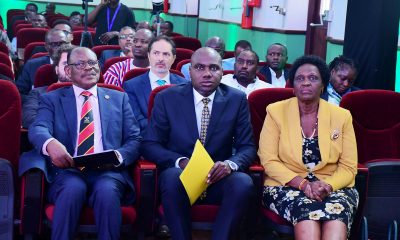

First African Symposium underscores the role of the Centre of Excellence for Africa Climate-Sensitive Macroeconomic Modelling
Health
Makerere University School of Public Health Graduates First Cohort of Cost-Effectiveness Analysis Short Course
Published
3 days agoon
February 20, 2026By
Mak Editor
Kampala, Uganda – The Makerere University School of Public Health (MakSPH) has marked a significant milestone with the graduation of the first-ever cohort of its Cost-Effectiveness Analysis (CEA) Short Course. The pioneering programme is designed to strengthen capacity in economic evaluation in Uganda and beyond.
The virtual graduation ceremony honored eleven (11) participants who completed the course. The cohort included professionals from academia, research institutions, government agencies, and non-state actors, reflecting the increasing demand for skills in economic evaluation across sectors.
The short course was developed and implemented by the Department of Health Policy, Planning, and Management (HPPM) in response to the increasing need for evidence-informed decision-making in a context of limited resources.
In her remarks during the ceremony, Assoc. Prof. Suzanne Kiwanuka, Head of the Department of Health Policy, Planning and Management (HPPM) at MakSPH, congratulated the inaugural cohort for completing what she described as a “critical and timely” course.
“With decreasing resources and rising demand for services driven by population growth and the emergence of high-cost technologies, decision-makers must make difficult choices,” she noted. “Cost-effectiveness analysis is no longer optional. It is central to conversations in the corridors of power.”
The CEA short course was designed to equip policymakers, researchers, and practitioners with both theoretical knowledge and practical skills in economic evaluation. Participants were introduced to key principles of health economics, costing methodologies, decision-analytic modelling, Markov modelling, sensitivity analysis, and interpretation of incremental cost-effectiveness ratios (ICERs).
According to Prof. Elizabeth Ekirapa, the course lead at MakSPH, this inaugural offering had been “a long time coming,” following years of discussions within the department about building local expertise in economic evaluation.
Delivered over 10 days through interactive online sessions, the course combined lectures, case studies, and hands-on modelling exercises using contextually relevant datasets. Participants were required to develop and present applied cost-effectiveness projects as part of their assessment, allowing them to translate theory into practice.

During the feedback session at the graduation ceremony, faculty emphasized the importance of clarity in defining study perspectives, selecting appropriate outcomes, and aligning research questions with modelling approaches.
Dr. Chrispus Mayora, one of the facilitators, highlighted the need to carefully select outcomes that directly reflect the intervention being evaluated. “When thinking about outcomes, ask yourself: Is this aligned with what I want to study? Interesting outcomes are not always the most appropriate ones,” he advised.
Participants were also encouraged to select modelling techniques such as decision trees or Markov models based on the research question and the nature of the disease or intervention under study.
Prof. Ekirapa described the graduates as “trailblazers,” noting that their feedback would shape future iterations of the course. “When you are the first cohort, you are like pioneers,” she remarked. “We are committed to improving this course to ensure it becomes a world-class programme.”
For many attendees, the graduation ceremony was a new experience, as certificates were awarded virtually an approach that participants welcomed as innovative and inclusive.
“Cost-effectiveness analysis enables us to maximise value for money,” noted Dr. Crispus Mayora of MakSPH. “It allows decision-makers to compare interventions systematically and ensure that limited resources achieve the greatest possible benefit.”
The programme aligns with Makerere University’s broader mandate to provide high-quality training that responds to national and regional development priorities. Participants who successfully complete the course receive a certificate signed by the Dean of the School of Public Health.
As the ceremony concluded, faculty encouraged continued engagement beyond the classroom. Graduates were urged to refine their project ideas and collaborate with the department in advancing research and policy discussions.
The successful completion of the first CEA short course marks an important step in building a cadre of professionals equipped to conduct rigorous economic evaluations. With plans to expand and refine the programme based on participant feedback, the HPPM department under MakSPH is positioning itself as a regional leader in health economics and policy analysis training.
Health
Uganda has until 2030 to end Open Defecation as Ntaro’s PhD Examines Kabale’s Progress
Published
5 days agoon
February 18, 2026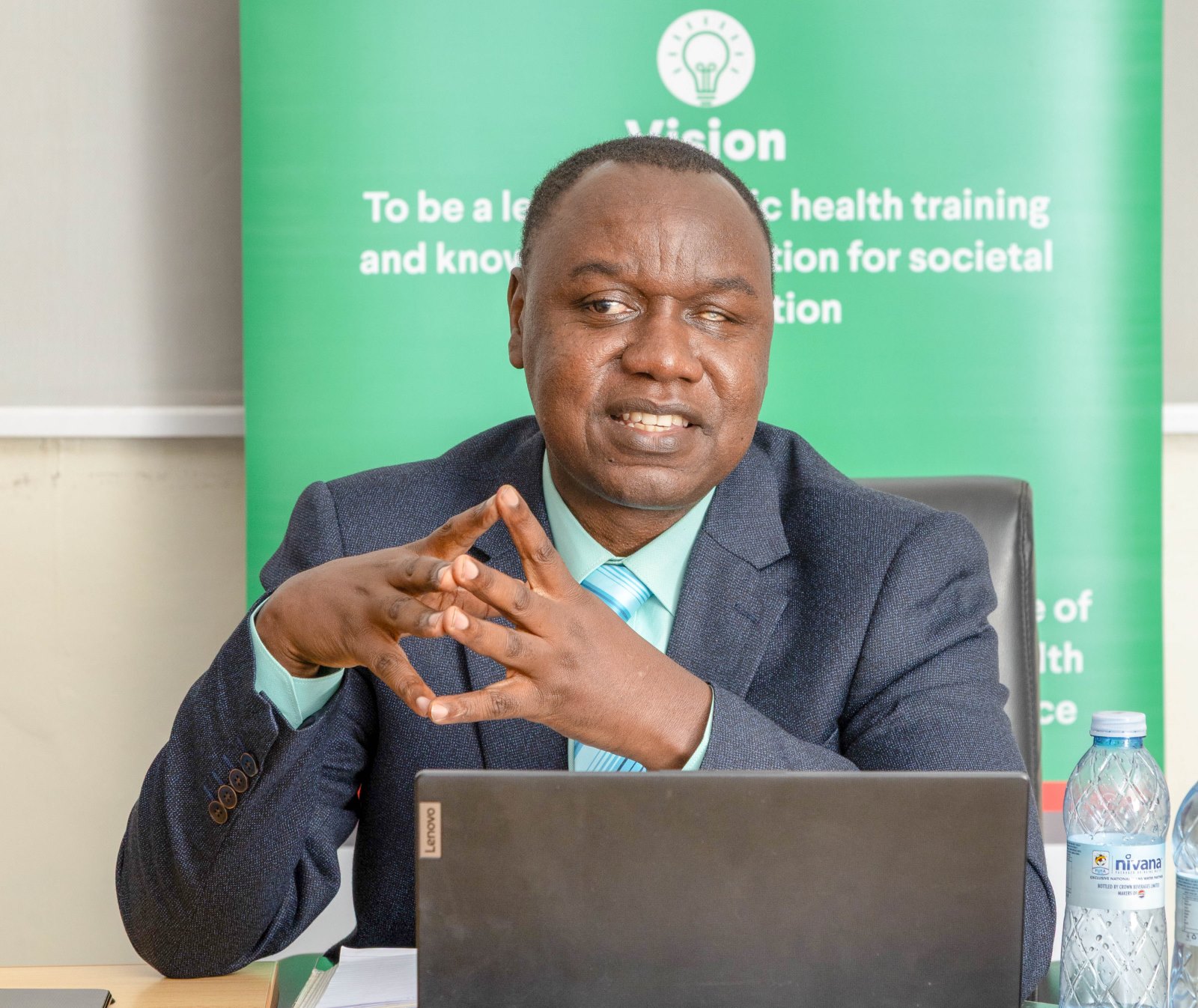
Silhouettes slip along narrow paths, farmers heading to their gardens, women balancing yellow jerrycans on their hips, children in oversized sweaters hurrying to school, and herders steering cattle toward open pasture, each movement part of a choreography older than memory. This is a quiet ritual in Kabale’s terraced hills, moments before the sun lifts.
The quiet procession to ahakashaka, or omukishaka, often sees figures moving quickly along familiar footpaths in the half-light, as children and adults walk with the urgency of habit. It is not a stroll but often a small, hurried run before daylight exposes what should be private.
It is February 2026, and the century-old Makerere University is celebrating its 76th Graduation Ceremony. The world paces and races toward artificial intelligence and digital revolutions. But some families still begin their day by rushing to the bushes for relief and concealment, while others engaged in economic activities such as gardening and grazing have no sanitation option other than using their surroundings to respond to the nature call!
The deadline to end open defecation is 2030. The science is settled, and the commitments are written into Sustainable Development Goal 6. Yet in parts of Kabale, only a small fraction of households is truly open defecation free.
In his PhD research, Dr. Moses Ntaro did not start with global targets or conference declarations. He began where the morning run ends, at the edge of the compounds, behind banana stems, along worn paths leading to Omukishaka. He asked whether students, equipped not with bricks but with conversation, follow-up, and persistence, could help communities replace that dash with something quieter: a door that closes.
What he found is both hopeful and unsettling. Change is possible. But dignity, like sunrise, should not require a run. And with 2030 approaching, time is no longer generous.
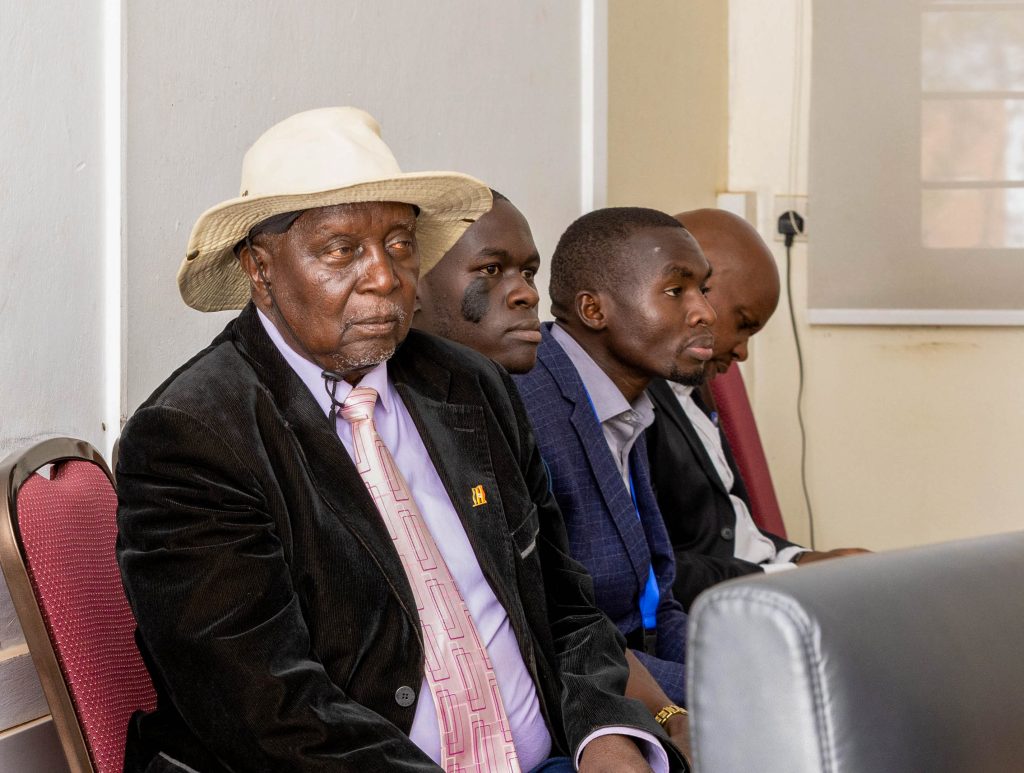
The Question That Would Not Let Him Go
Ntaro did not encounter open defecation as a statistic. While on foot and serving as Assistant Coordinator of Community-Based Education at Mbarara University of Science and Technology (MUST), he learned while supervising students placed in rural communities across southwestern Uganda. They walked villages together, conducted transect walks… and they observed.
“In my role as academic coordinator,” he explains, “students always took me on transect walks within the villages to show me how high open defecation practice was. The effect was evident in the high prevalence of intestinal infections we saw in health facility records.”
The link between sanitation and disease was not theoretical but visible in clinic registers. Diarrhea, intestinal worms, recurring infections among children, and more were all visible in the clinic registers.
Nineteen years ago, in 2007, Uganda adopted Community-Led Total Sanitation (CLTS), a strategy designed to trigger collective behavior change and eliminate open defecation. Progress, however, remained uneven. That same year, Ntaro was working as an Environmental Health Officer with the Water and Sanitation Development Facility under the Ministry of Water and Environment. He was three years away from completing his Environmental Health degree at Makerere University School of Public Health.
And so, the question emerged, to Ntaro, that, ‘If students are already embedded in these communities through COBERS placements, why are we not intentionally harnessing them to accelerate sanitation change?’
That question became his PhD.
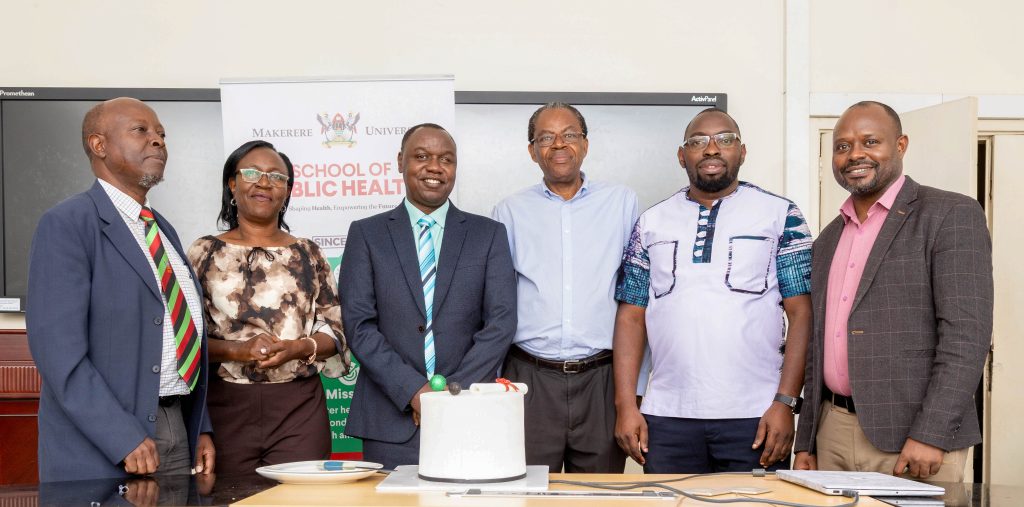
This is a Crisis That Should No Longer Exist
Globally, more than 350 million people still practice open defecation. Sub-Saharan Africa carries a disproportionate share. SDG 6, specifically Target 6.2, commits the world to ending open defecation and ensuring universal access to safe sanitation and hygiene by 2030. It prioritizes women, girls, and vulnerable populations. It speaks of dignity, of safely managed services, and of disease prevention.
We are four years away from that deadline. And in rural Kabale District, somewhere in southwestern Uganda, Ntaro’s research found that only 3 percent of households were truly open defecation-free.
Yes, three percent. His 2025 BMC Public Health study examined 492 residents. The average age was 49. Nearly 30 percent had no formal education. Most were women, the custodians of household hygiene and child health.
The determinants of Open Defecation Free (ODF) status were deeply behavioral.
Male-headed households had higher odds of being ODF. Households with clean compounds, clean latrine holes, and consistent handwashing practices were significantly more likely to sustain sanitation improvements.
Sanitation, Ntaro realized, is not only infrastructure but also power, memory, habit, and social expectation.
“Factors associated with ODF status were not just economic,” he notes. “They were behavioral and contextual.”
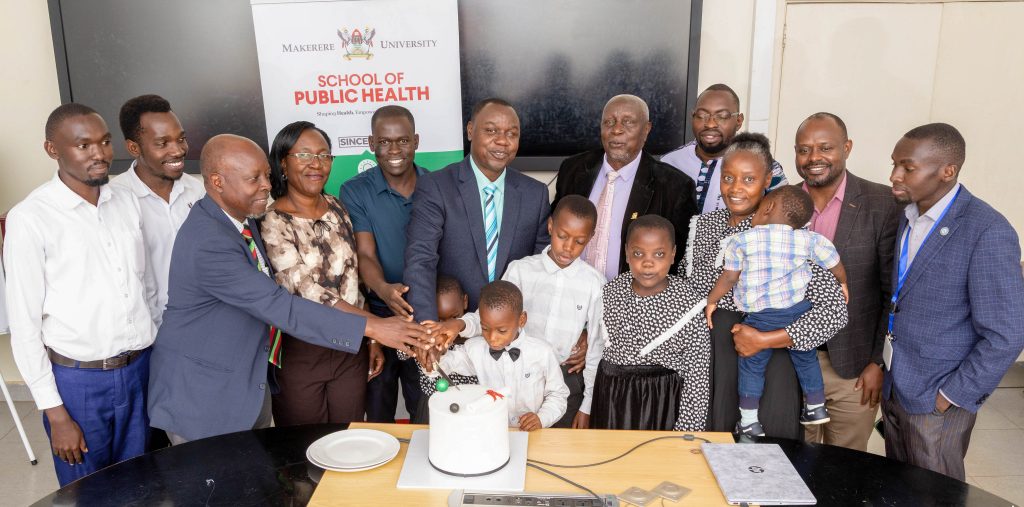
Why It Feels So Wrong to Still Discuss This
Talking about open defecation in 2026 feels unsettling for three reasons. First, it feels like a failure of basic dignity.
Think of an era of global connectivity and rapid technological advancement, and hundreds of millions still lack privacy. For women and girls, this exposes them to harassment, exploitation, and fear. Sanitation is not just about disease but safety.
Second, it feels like an avoidable health crisis. One gram of feces can contain millions of viruses, bacteria, and parasites. Open defecation directly fuels cholera, typhoid, diarrhea, and environmental enteropathy, a silent contributor to child malnutrition and stunting. The science is settled, and yet the practice persists.
Third, it feels like a poverty trap. Illness leads to lost productivity; lost productivity deepens poverty, and poverty limits investment in sanitation. The cycle continues.
“Open defecation is not simply a sanitation issue,” Ntaro says. “It is linked to poverty, nutrition, and broader development.”
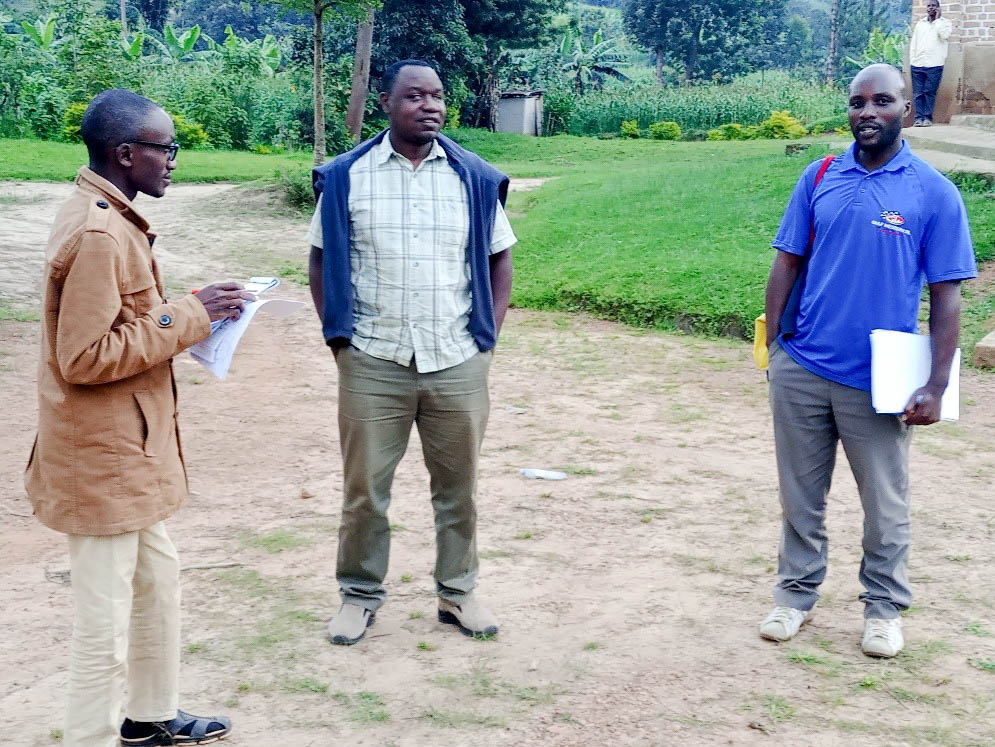
Testing a Different Approach
Ntaro’s doctoral thesis, “Effect of Student Community Engagement on Open Defecation-Free Status,” tested whether health profession students could effectively facilitate Community-Led Total Sanitation.
In some villages, traditional Health Extension Workers led the sanitation process. In others, trained students facilitated it under the COBERS (Community-Based Education, Research, and Service) model, which places medical trainees in community health facilities to learn through real-world practice, bridging classroom theory with primary care and public health work in rural settings.
Through this model, students led triggering, follow-ups, and community engagement. Open defecation declined. More households achieved Open Defecation Free status. And the cost per household was lower than in traditional approaches.
“Students were more effective,” Ntaro explains. “More households became open defecation-free compared to the traditional approach. And they were a cheaper human resource.”
But cost was not the real breakthrough. Presence was. Students stayed for weeks. They returned to check on latrines. They built trust. They kept coming back. Because sustainability, Ntaro argues, is not built in a single visit. It is built in repetition.
“There is a need for continued follow-ups and continued student engagement if long-term impact is to be realized.”
Change cannot be declared once and forgotten.
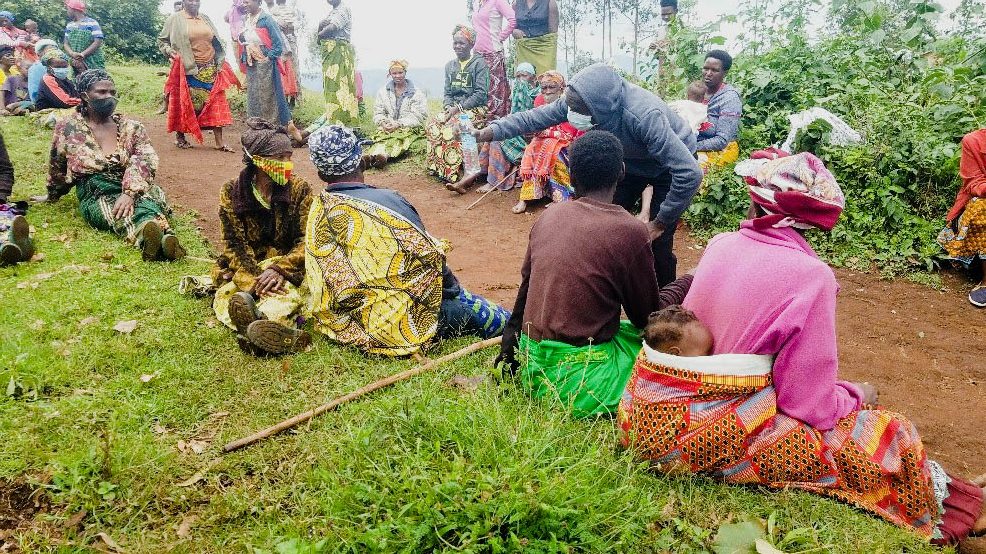
Behavior… and Not Just Bricks
Using the RANAS framework, Ntaro found that households that remembered to wash hands and kept latrines clean were far more likely to sustain Open Defecation Free status. In sanitation, behavior leaves evidence.
“Behavioral change interventions that empower communities,” he recommends, “such as CLTSH, should be strengthened to increase households with ODF status.”
In other words, building latrines is not enough, but communities must believe in them.
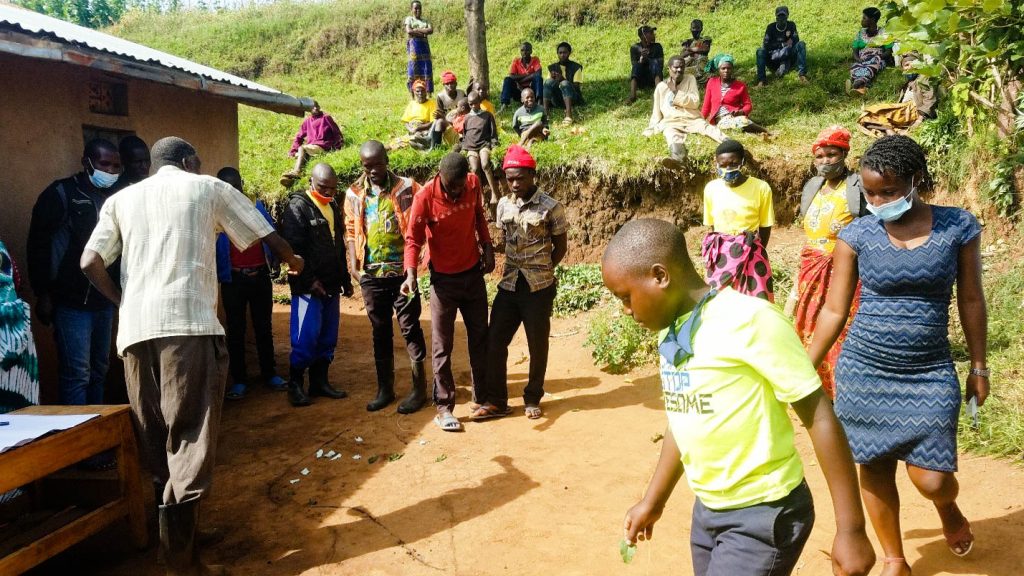
The Defense and the Countdown
On December 11, 2025, Ntaro defended his PhD. Examiners pressed him on scale and sustainability. Could student engagement be institutionalized? Could universities be embedded in district sanitation planning?
His answer was pragmatic: “Yes, but community-based education must be included in planning and budgeting.”
Four years remain to meet SDG 6.2. Four years to end open defecation and turn dignity from promise into practice. In 2026, this conversation should feel outdated. Instead, it remains urgent.
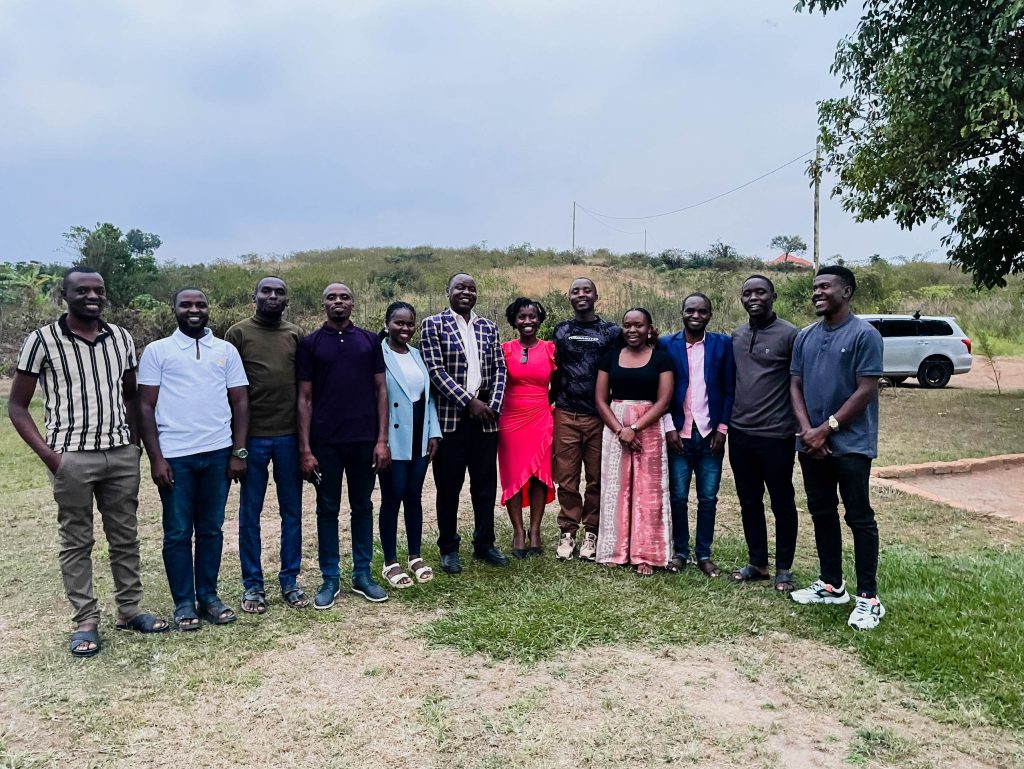
The Slow Work of Restoration
In Kabale, progress does not look dramatic. It looks like a latrine door closing firmly behind someone, a handwashing station with water and soap, a compound swept clean. It looks like a child who does not fall ill this month. Public health victories are often quiet.
As Makerere University approaches its 76th Graduation Ceremony, Dr. Ntaro Moses stands among its PhD graduands not with theory alone, but with evidence that change can be accelerated by reimagining who leads it. Students, he shows, are not only learners. They are the workforce, facilitators, and bridges between policy and path.
The hills of Kabale still wake under mist. But in more compounds now, privacy exists where bushes once stood open. Dignity is not restored in headlines, but one household at a time.
And with 2030 approaching, Ntaro’s work leaves a final, unavoidable question: if we already know how to end open defecation, if we already have the tools, the evidence, and the people, what, exactly, are we waiting for?
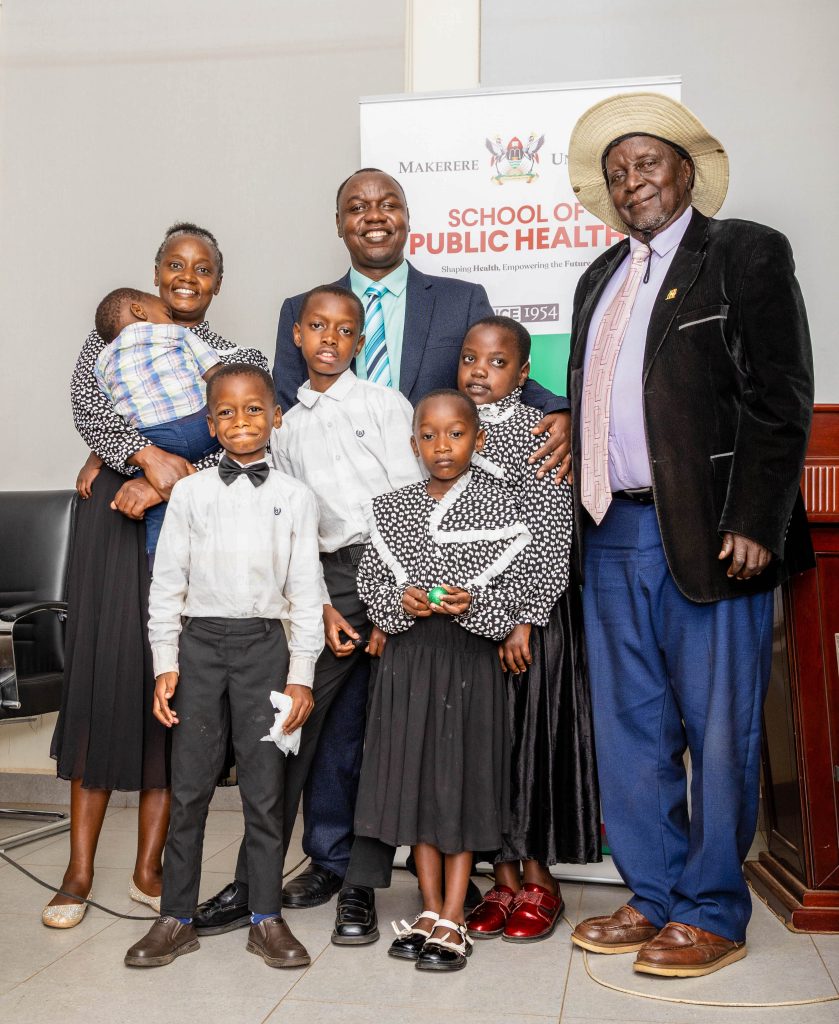
— Makerere University School of Public Health Communications Office, Graduation Profiles Series, 76th Graduation Ceremony
Health
Olivia Nakisita and the Quiet Urgency of Adolescent Refugee Health
Published
6 days agoon
February 18, 2026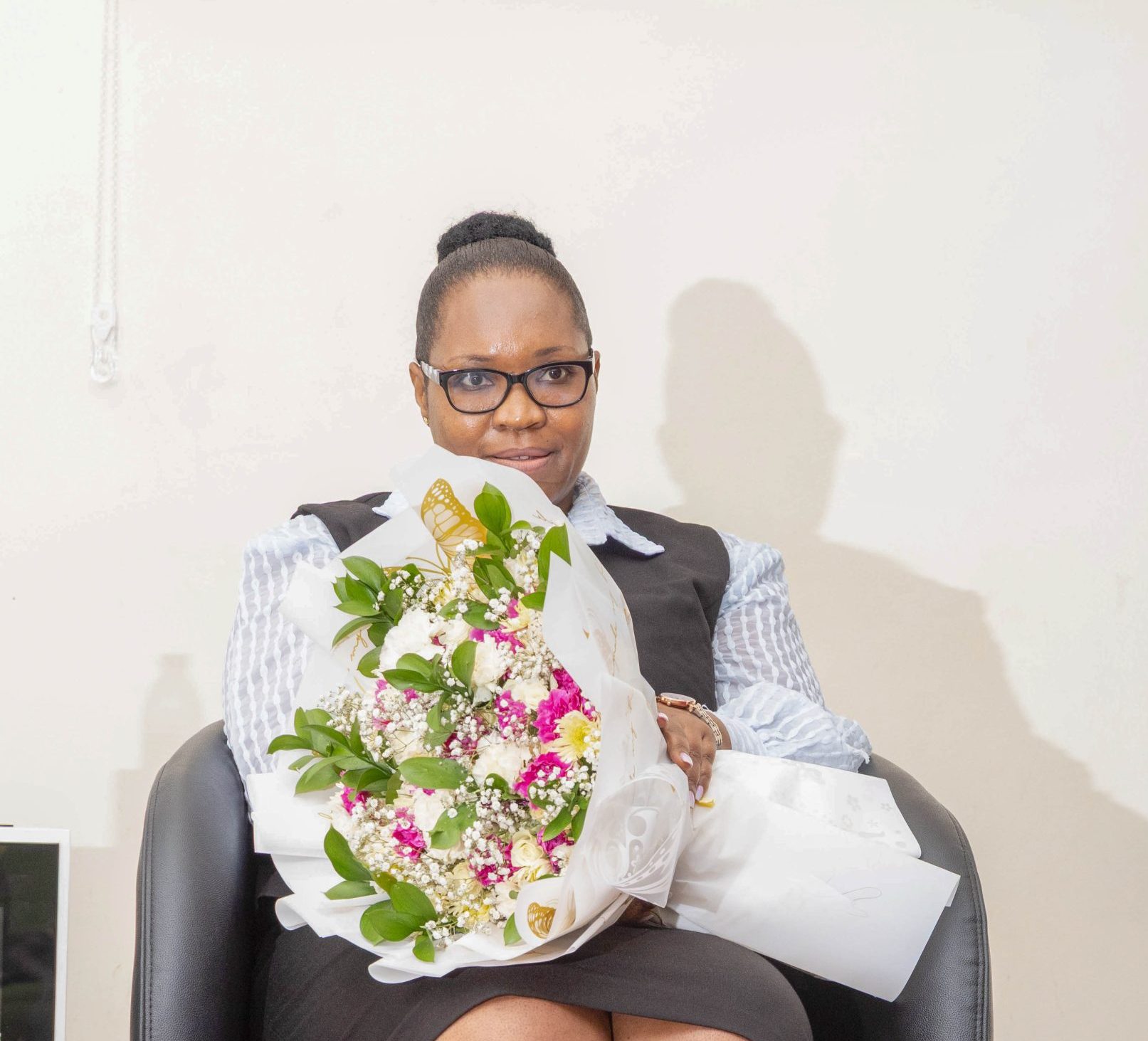
Kampala wakes early, but for some girls, the day begins already heavy. In Uganda, nearly three-quarters of the population is under 30, growing up happens fast, and often without protection. One in four Ugandan girls aged 15–19 has already begun childbearing, giving Uganda the highest teenage pregnancy rate in East Africa.
Layered onto this is displacement. The country hosts about 1.7 million refugees, many living in cities like Kampala, where survival depends on navigating systems not designed with them in mind. Also, nationally, 1.4 million people live with HIV, and 70 per cent of new infections among young people occur in adolescent girls, a reminder that vulnerability is rarely singular. When COVID-19 shut the country down, the consequences were immediate, with pregnancies among girls aged 15–19 rising by 25.5 per cent, while pregnancies among girls aged 10–14 surged by 366 per cent.
The numbers tell a story of youth, risk, and quiet urgency. But they do not tell it all. For years, Olivia Nakisita, a public health researcher,has followed how adolescent girls, many of them refugees, navigate pregnancy in Kampala: how far they must travel for care, how early they arrive or delay, and how often services that exist fail to meet them where they are. Her work lives at the uneasy intersection of policy and lived reality, where access does not always translate into care.
February 25th 2026, is the day that her work on whether urban health systems are truly ready for the youngest mothers they now serve will bring her to Freedom Square at Makerere University, where she will graduate with a PhD in Public Health.
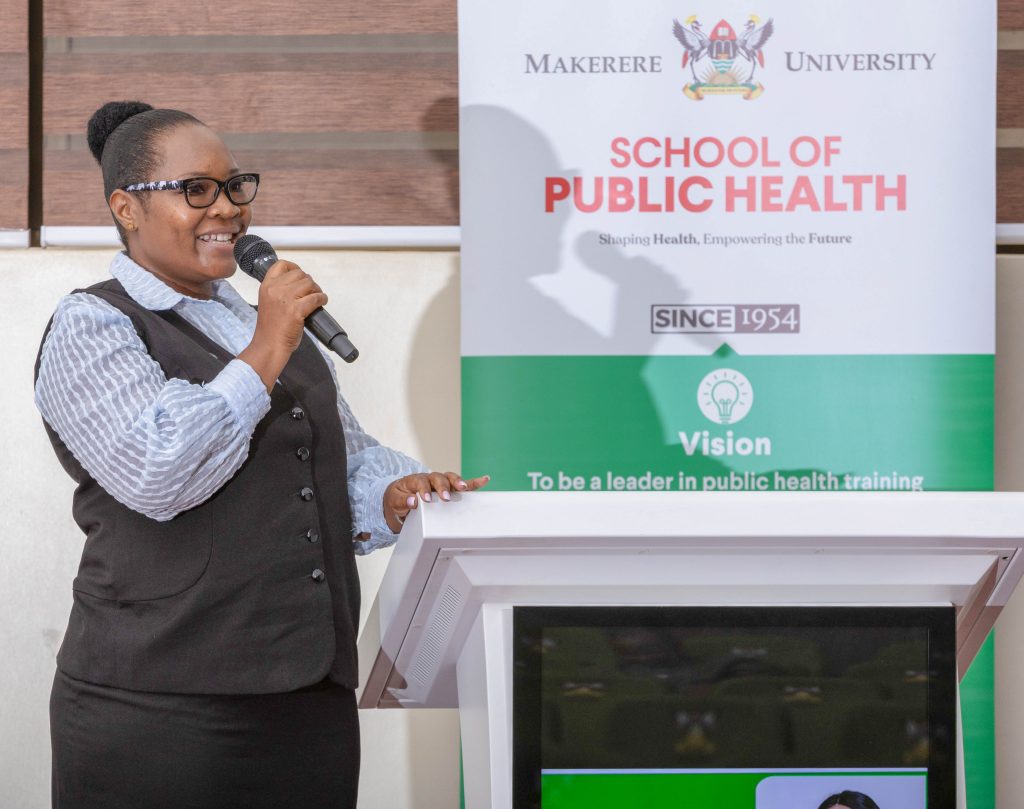
Her doctoral journey, focused on maternal health services for adolescent refugees in urban Uganda, has unfolded at the intersection of scholarship, community service, and the daily realities of young girls navigating pregnancy far from home.
The Work That Came Before the Question
Long before she began writing a PhD proposal, Olivia Nakisita was already immersed in adolescent health. As a Research Associate in the Department of Community Health and Behavioral Sciences at Makerere University’s School of Public Health, she taught graduate and undergraduate students, supervised Master’s research, and worked closely with communities. Beyond the university, she led New Life Adolescent and Youth Organization (NAYO), a women-led organisation she founded in 2021 to strengthen access to sexual and reproductive health and rights (SRHR) information and services for adolescents and young people.
It was through this community work that a troubling pattern began to surface.
“During our community service,” she explains, “we noted increasing teenage pregnancies, and we also noted challenges with access to maternal health services by teenage pregnant girls.”
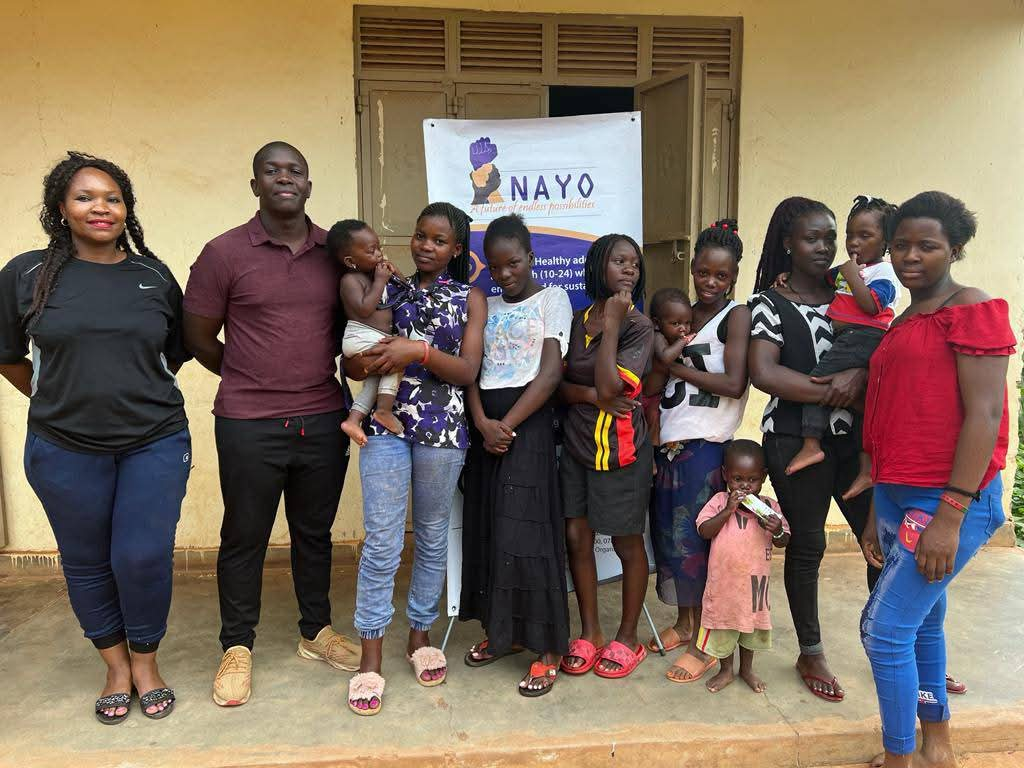
Among those girls were adolescents living as urban refugees in Kampala, young, displaced, often poor, and navigating pregnancy in a city not designed with them in mind.
For Nakisita, the concern deepened through her academic training in Public Health Disaster Management, one such programme that prepares multidisciplinary professionals with the technical expertise and leadership competencies required to plan for, mitigate, respond to, and recover from complex disasters through a public health lens. This programme sharpened Nakisita’s interest in how displaced populations survive within complex urban systems. Uganda’s integrated health model, where refugees and host communities are expected to use the same facilities, appears equitable on paper. In practice, it can be unforgiving.
“I got interested in understanding how these refugees who get pregnant manage to navigate the complexities of integration in host societies like Kampala,” she says. “This was driven by the desire to address their needs and to inform and evaluate existing refugee health policies.”
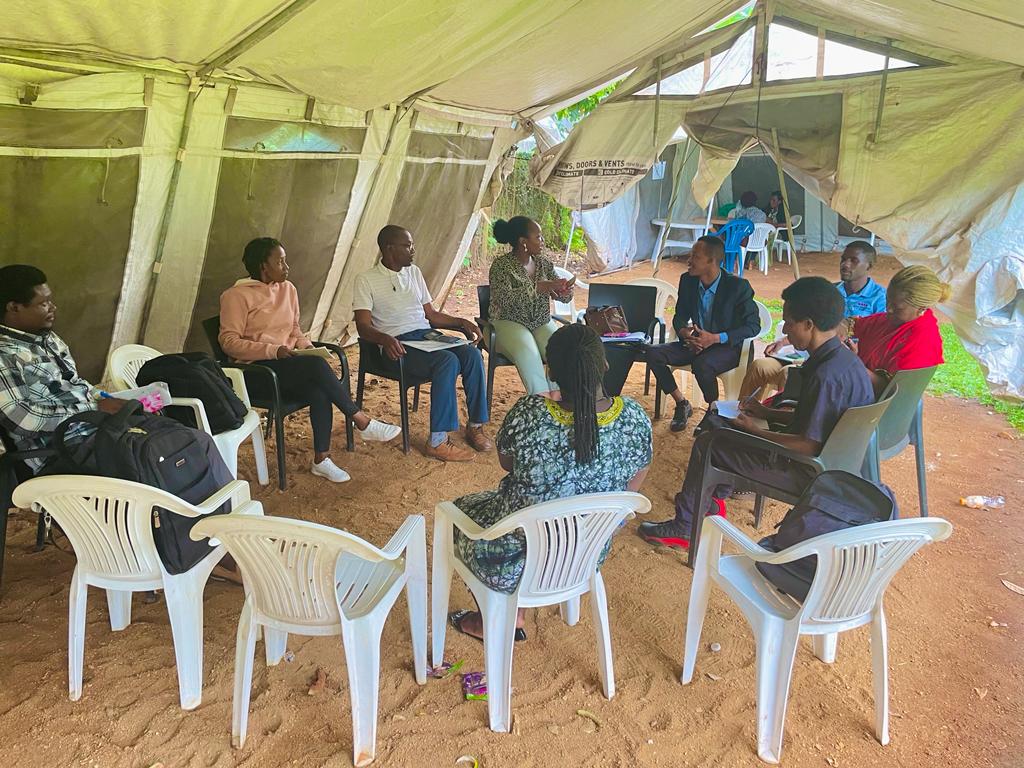
That desire became the foundation of her PhD.
Asking Hard Questions in a Crowded City
Her doctoral research, “Maternal Health Services for Adolescent Refugees in Urban Settings in Uganda: Access, Utilisation, and Health Facility Readiness,” was conducted in Kampala between November 2023 and August 2024. It combined quantitative surveys with qualitative interviews, engaging 637 adolescent refugees aged 10–19 years, alongside health workers and facility assessments.
Her findings showed high perceived access to maternal health services. Clinics existed. Services were available. Yet utilisation, particularly of antenatal care (ANC), lagged. “About three-quarters of the girls attended at least one antenatal visit,” she explains, “but only about four in ten attended in the first trimester.”
And that gap matters. Public health research shows that early and regular antenatal care allows health workers to detect high-risk pregnancies, initiate supplements such as iron and folic acid, monitor fetal development, and provide psychosocial support. Without it, risks compound silently.
By contrast, her study found that facility-based deliveries were remarkably high, with nearly all adolescent refugees (98.3%) giving birth in health facilities, suggesting that the system was reachable, but uneven.
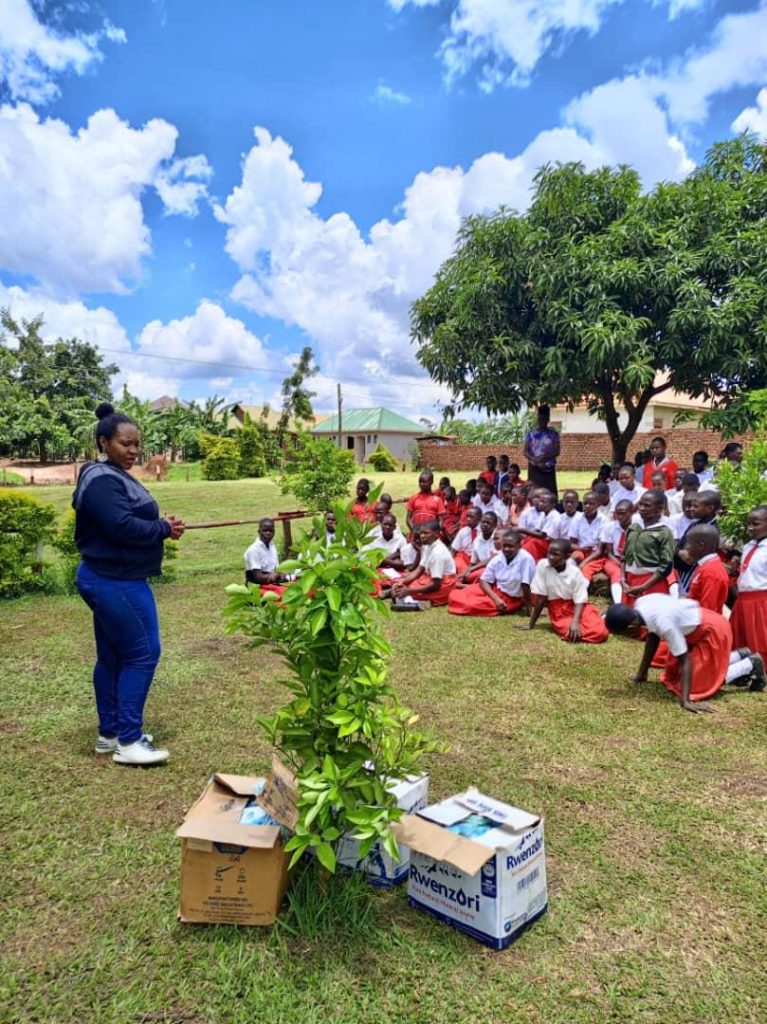
Where the System Falls Short
Her research went beyond utilisation to examine whether health facilities were actually ready to serve adolescent refugees.
Findings show that lower-level health centres in Kampala were moderately prepared to offer adolescent-friendly maternal health services. Some staff were trained. Some spaces existed. Despite this, critical gaps remained. For instance, facilities lacked essential equipment and supplies. Non-provider staff were often untrained. Separate, private spaces for adolescents were limited. Language barriers complicated care. Overcrowding strained already stretched health workers.
In her qualitative interviews, health workers expressed empathy and willingness to help. Many relied on peer educators and community health workers to reach adolescent refugees. But good intentions were not enough.
“They recommended training of healthcare workers, translators for refugees, and improvement in the availability of essential drugs, supplies, and equipment,” Nakisita notes.
She notes that readiness is not just about infrastructure but about the people, preparation, and priorities.
Research with an Emotional Cost
For Nakisita, working with adolescent refugees required care, not only methodologically, but emotionally.
Finding participants in Kampala was itself a challenge. Unlike settlement settings, urban refugees are dispersed, often invisible. Ethical considerations were constant. Adolescents who had given birth were legally considered emancipated minors, but their vulnerability remained.
Though the thesis focused on systems rather than personal narratives, Nakisita’s earlier work with adolescents informed every decision she made. It shaped how she framed questions, interpreted data, and weighed policy implications. This was not detached research, but careful, deliberate, and grounded.
The Scholar Formed by Continuity
Nakisita’s PhD sits atop more than 18 years of experience in training, research, and community service. She is an alumna of Makerere College School (UCE), 1996 and Greenhill Academy Secondary School (UACE), 1998, a long journey through Uganda’s education system before her Diploma in Project Planning and Management at Makerere University completed in early 2000s.
She would later return eight years later to Makerere University for her Bachelor’s degree in Social Sciences and a Master’s in Public Health Disaster Management, and now a PhD in Public Health.
Her academic rigor is reflected in extensive training across SRHR, impact evaluation, research methods, ethics, disaster resilience, and humanitarian health. She has presented at regional and international conferences and published in peer-reviewed journals on adolescent health, refugee maternal care, gender-based violence, and health systems readiness.
As a PhD student, she supervised three Master’s students to completion, with another currently progressing, quietly extending her influence through mentorship.
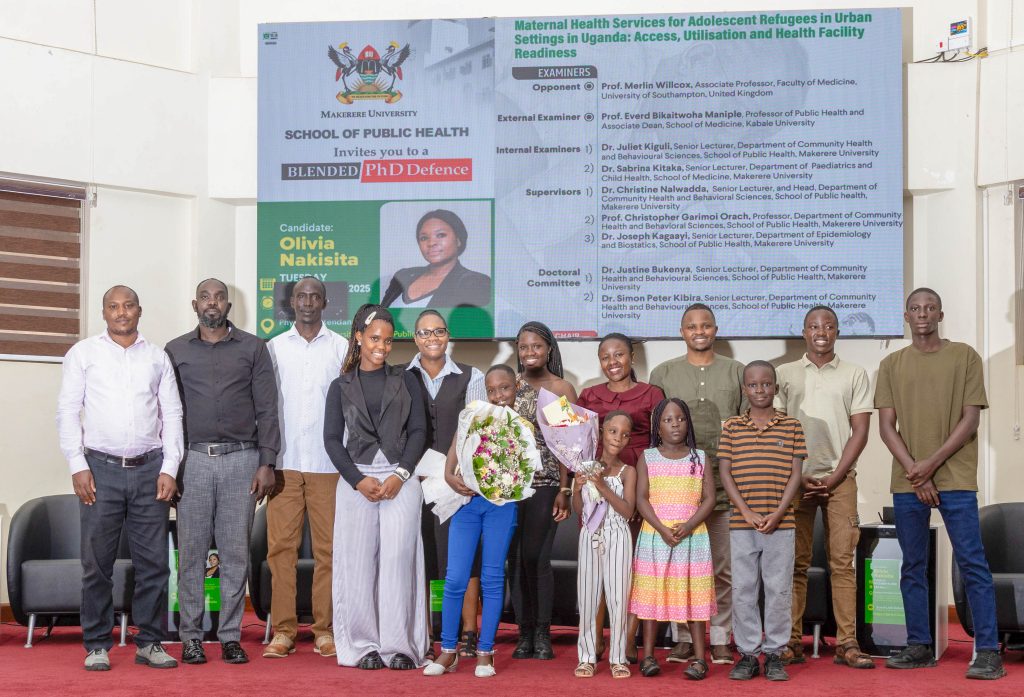
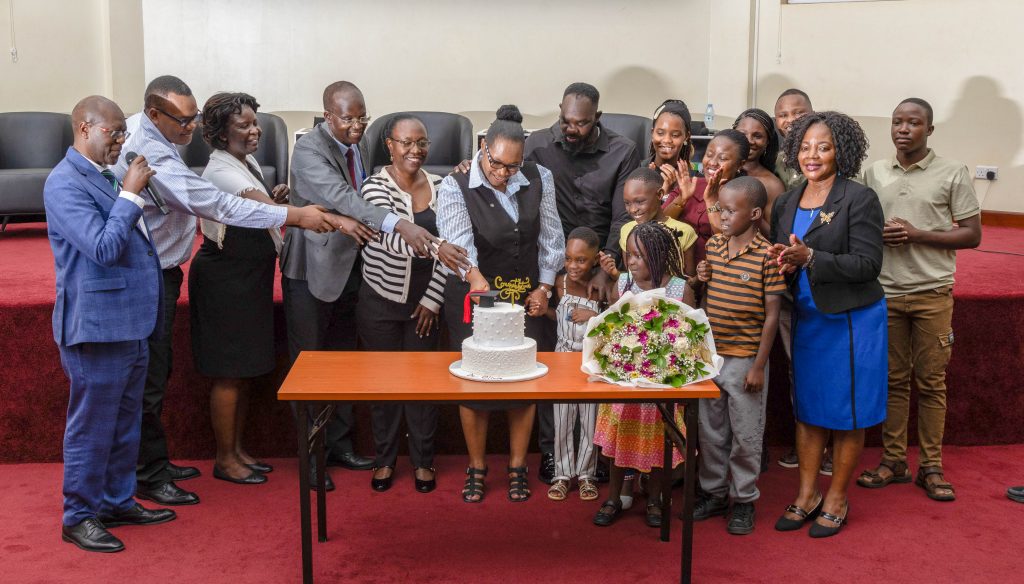
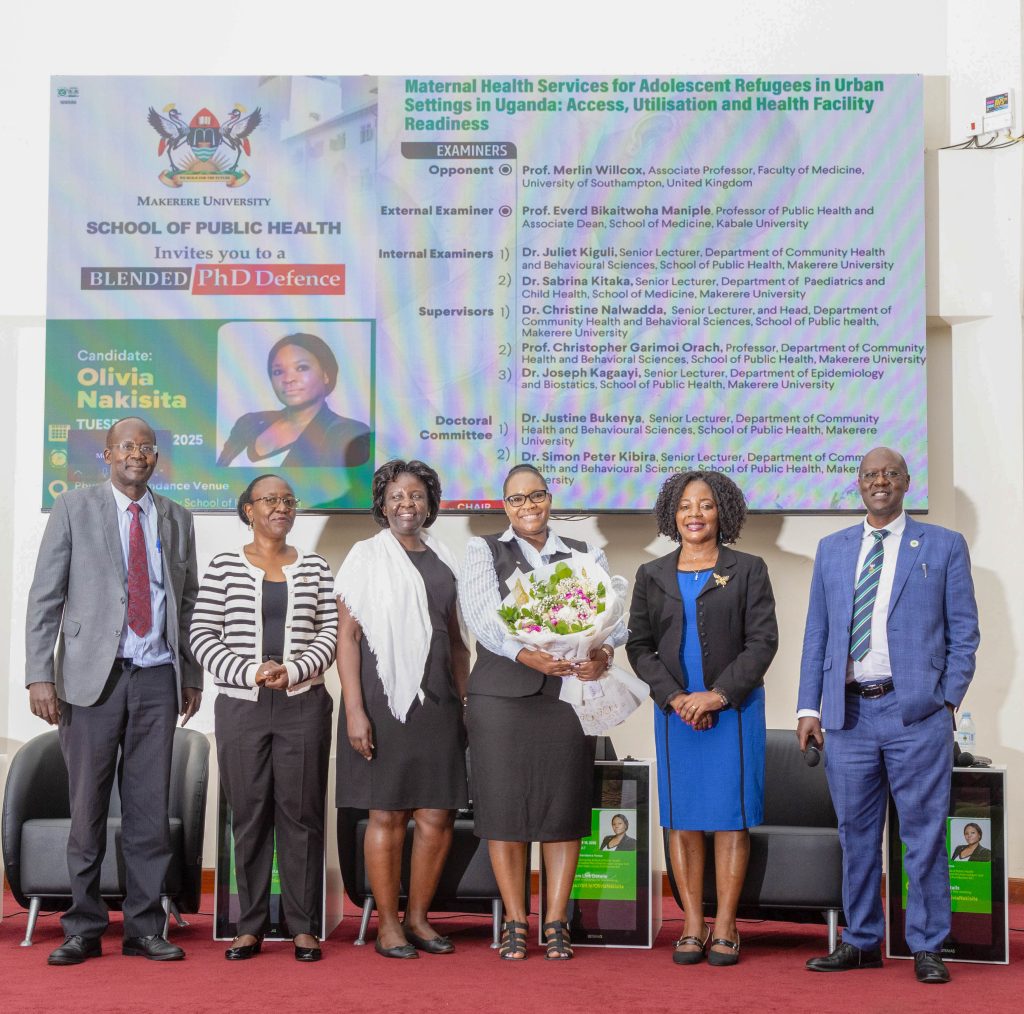
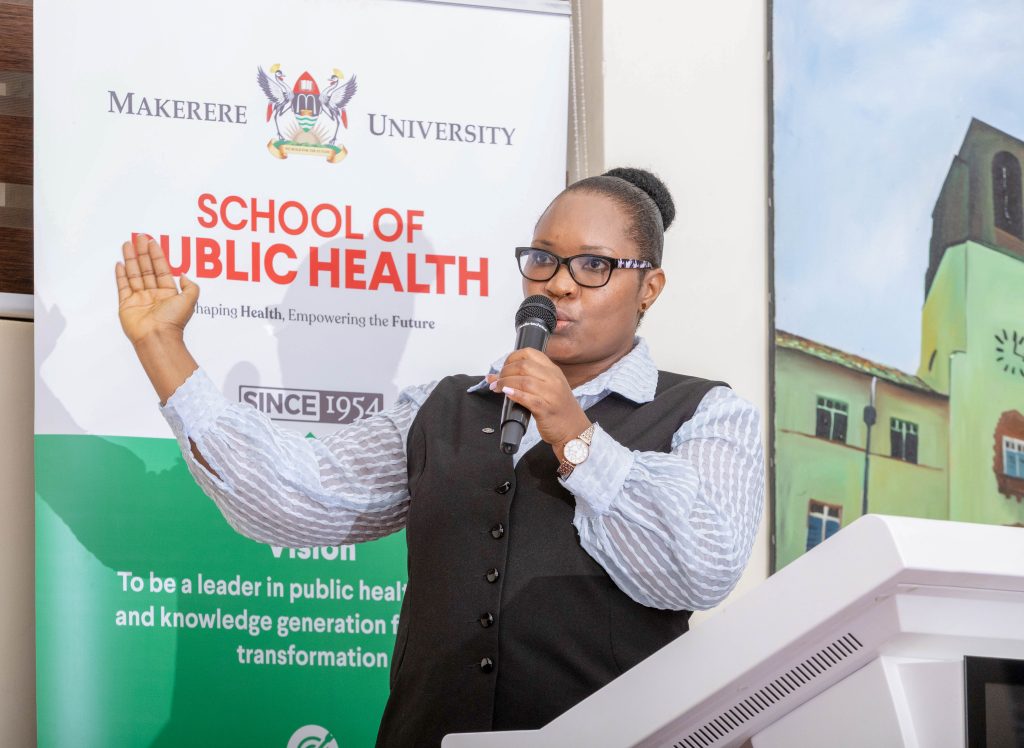
When Evidence Demands Action
If policymakers were to act on one lesson from her research, Nakisita says; “Emphasis should be given to maternal health services for adolescents.” “They are high-risk mothers,” she adds.
Her findings call for targeted community-based interventions, outreaches, home visits, and financial support for adolescents who cannot afford prescribed drugs, delivery requirements, or critical tests like ultrasound scans.
They also call for health systems to move beyond one-size-fits-all models, recognising that age, displacement, and poverty intersect to shape how care is accessed and experienced.
Now that her PhD is complete, Nakisita plans to translate research into action. Several papers from her study have already been published. A policy brief is planned to influence decision-making in urban and humanitarian health settings.
When asked what she would say directly to adolescent refugee girls navigating pregnancy in unfamiliar cities, her response is simple and direct.
“If it happens,” she says, “as soon as you find out, go to the nearest health facility and seek care. Always return for the visits as asked by the health worker. Ensure that you deliver in a health facility with a skilled health worker.”
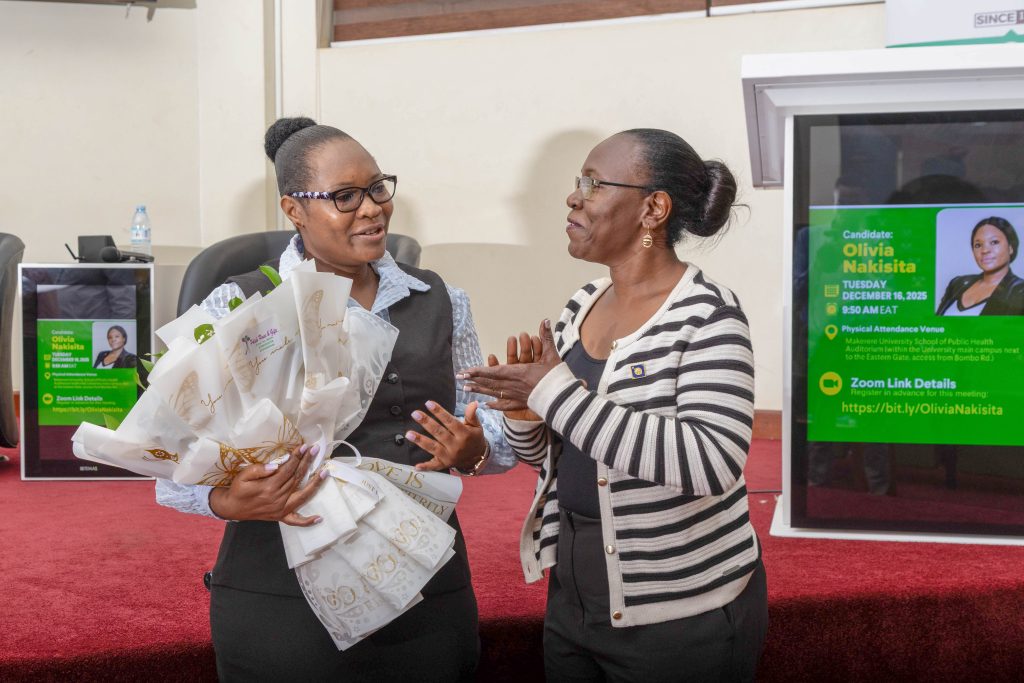
Arrival, Without Illusion
When Dr. Olivia Nakisita steps onto the graduation stage at Freedom Square, applause will follow. But the true significance of that moment lies in health facilities still struggling to adapt; in adolescent refugees whose pregnancies unfold quietly in rented rooms and crowded neighborhoods; in policies waiting to be sharpened by evidence.
Her scholarship does not promise quick fixes but offers clarity.
Among the PhDs conferred at Makerere University’s 76th graduation, her work reminds us that some research does not begin in libraries and does not end with theses. It lives on in the slow, necessary work of making health systems see those they have long overlooked.
— Makerere University School of Public Health Communications Office, Graduation Profiles Series, 76th Graduation Ceremony
Trending
-

 General2 weeks ago
General2 weeks agoAptitude Exam (Paper 1) Results for the Mature Age Entry Scheme 2026/2027
-

 Health5 days ago
Health5 days agoUganda has until 2030 to end Open Defecation as Ntaro’s PhD Examines Kabale’s Progress
-

 General6 days ago
General6 days agoMastercard Foundation Scholars embrace and honour their rich cultural diversity
-

 General2 weeks ago
General2 weeks agoFor Youth by Youth – Call for Second Cohort Applications
-

 Agriculture & Environment4 days ago
Agriculture & Environment4 days agoUganda Martyrs Namugongo Students Turn Organic Waste into Soap in an Innovative School Project on Sustainable Waste Management
